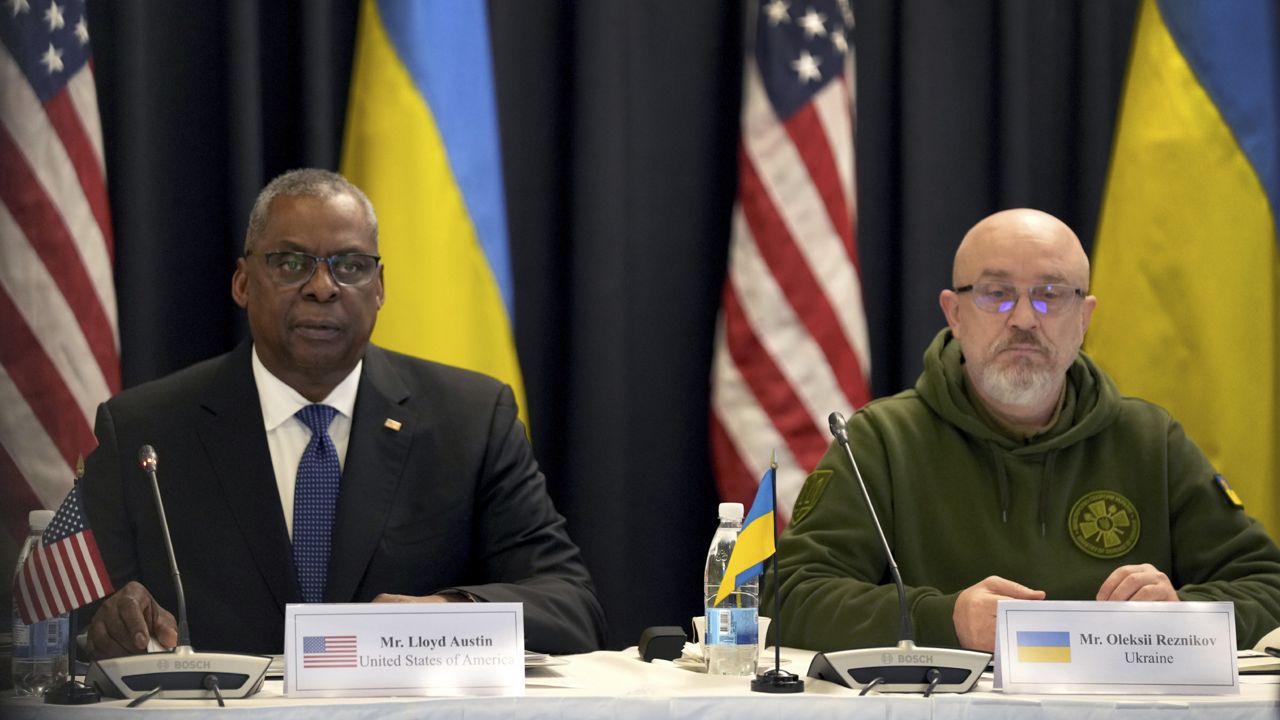Military leaders from the United States and other countries on Friday gathered at a U.S. Airbase in Germany to discuss sending more weapons to Ukraine as Russia’s invasion of the country inches towards a year.
It was the eighth such meeting of the Ukraine Defense Contact Group, which comes amid a debate in capitals across Europe about how much weaponry should be sent as the war in Ukraine continues.
During Friday’s meeting, U.S. Defense Secretary Lloyd Austin said the country “remains determined to lead — and to do our part to help Ukraine defend itself.”
“We need to dig even deeper. This is a decisive moment for Ukraine — and a decisive decade for the world,” Austin added. “So make no mistake: We will support Ukraine's self-defense for as long as it takes.”
In early January, the Defense Department said it was giving another $3.1 billion dollars in military aid to Ukraine. On Thursday, the U.S. announced an additional $2.5 billion in assistance, including Stryker combat vehicles and Bradley fighting vehicles.
Still, defense leaders Friday failed to resolve divisions over providing advanced battle tanks to Ukraine after more than five hours of discussions.
The defense minister of Poland, which has pledged a company of 14 Leopard tanks on condition that other countries also supply them, said 15 countries that have the German-made Leopards discussed the issue but no decisions were made.
Back in Washington, there have been some signs of hesitation among the new Republican-controlled House of Representatives in approving additional funds for Ukraine.
Rep. Kevin McCarthy, R-Calif, the newly-elected House Speaker, is seen as broadly supportive of the war effort – but the most consequential thing he said recently was last October.
“I think Ukraine is very important. I support making sure that we move forward to defeat Russia in that program,” he told Punchbowl News at the time “But there should be no blank check on anything.”
There is a big non-interventionist part of the Republican Party, though it remains to be seen if that will translate into policy or funding in the 118th Congress.
When asked by CNN’s Jake Tapper whether Ukraine could count on the Republican majority to continue sending aid, Rep. Michael McCaul, R-Texas, chairman of the House Foreign Affairs Committee, said “the answer is yes,” adding: “The fact is, we cannot give up this fight. You see what's at stake here.”
McCaul also spoke to the efforts of a group of rightwing Republicans, led by Rep. Marjorie Taylor Greene, R-Ga., who have pushed for additional insight into the funds being provided to Ukraine, saying: “I think what [Greene] wants, and others, is oversight accountability. Where's the money going to? They'd like to see audits.”
Greene in December led an effort in front of the House Foreign Affairs Committee to audit funds being sent to Ukraine. Though Democrats tanked the motion at the time, Greene pledged to bring the issue up again when Republicans resumed control of the House.
On Monday, Greene tweeted: “It’s time to protect OUR border, not Ukraine’s.”
Rep. Nancy Pelosi, D-Calif., the former Democratic Speaker of the House, remains very much in favor of American involvement in the war. One of the last things Pelosi did as Speaker was have the Ukrainian president deliver an address before Congress.
Still, foreign policy experts are equally split on the idea of providing certain weapons to Ukraine.
Evelyn Farkas, who was a deputy assistant secretary of defense in the Obama administration and a special advisor to the Secretary of Defense for the NATO Summit, said there should be a growing sentiment that Russia must be defeated – and that “sooner is better than later.”
“I think we're getting closer to a point now where there's a realization that Russia needs to be defeated militarily,” Farkas told Spectrum News. “First, because there's a danger that the war could spread if this goes on. Second, because frankly, it's the morally correct thing to do. We are either supporting Ukraine all in – or what? You can't support someone halfway.”
Daniel Davis, a former lieutenant colonel in the U.S. Army, leaned more towards McCarthy’s sentiments of not offering a “blank check” to Ukraine when it comes to military support. Davis a decade ago became a whistleblower when he said military leaders weren’t leveling with the public about the war in Afghanistan.
“If you want to talk about a moral case, I think that there's a bigger moral case that the United States government needs to primarily concern itself with the security of our country and of our NATO alliance,” Davis told Spectrum News. “And if we can help Ukraine in the process, do that without putting any undue stress on our country or our alliance, then that's something that we can look at.”
“But by no means should we just say whatever Ukraine needs, we should give,” he added.
As for the war, it continues. A Russian missile attack at an apartment in Dnipro Saturday killed at least 45 people, including six children.
And Wednesday, a helicopter crash killed more than a dozen people including the country’s Interior Minister and a child after crashing into a kindergarten. It’s under investigation. There was no fighting reported in the area.
The Associated Press contributed to this report.



